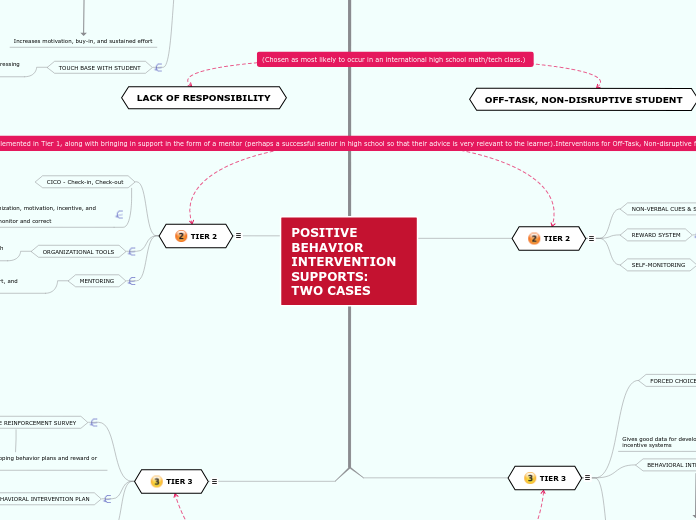POSITIVE BEHAVIOR INTERVENTION SUPPORTS: TWO CASES
TIER 1
It helps keep students engaged
Provides off task, disruptive, inattentive, and other students with a non-verbal cue to stop what they are doing and get back on task
Is a subtle way to address behaviors and students without drawing a lot of attention (very important for working with high school students)
Can be a subtle re-direction technique
Teaches students to take responsibility for their choices
It teaches that when an action occurs, a consequence follows Are similar to what would happen to an adult in a comparable situation
Main topic
TIER 2
Creates a working relationship with student without calling attention to the student in a negative manner
Increases on task and attending behaviors
Improves on task behaviors
Increases productivity
Improves self awareness and reflection
TIER 3
Gives good data for developing behavior plans and reward or incentive systems
Provides more intensive intervention and monitoring
Increases support around student
Provides an individualized plan for success
When students are age appropriate and involved in meetings, they tend to take interventions more seriously, feel included, and are held directly responsible from the parties involved
TIER 1
Teaches students to take responsibility for their choices
It teaches that when an action occurs, a consequence follows Are similar to what would happen to an adult in a comparable situation
Improves students’ perceptions of the work and assignments
Increases student willingness and participation
increases work production, compliance, & engagement
Increases motivation, buy-in, and sustained effort
Keeps students moving forward, motivated, and progressing
Holds students accountable
TIER 2
CICO - Check-in, Check-out
Improves student organization, motivation, incentive, and reward
Helps students to self monitor and correct
Increases student responsibility and follow through
Holds students more accountable
Improves student motivation
Source of accountability, encouragement, support, and advocacy
TIER 3
Gives good data for developing behavior plans and reward or incentive systems
Provides more intensive intervention and monitoring
Increases support around student
Provides an individualized plan for success
When students are age appropriate and involved in meetings, they tend to take interventions more seriously, feel included, and are held directly responsible from the parties involved
